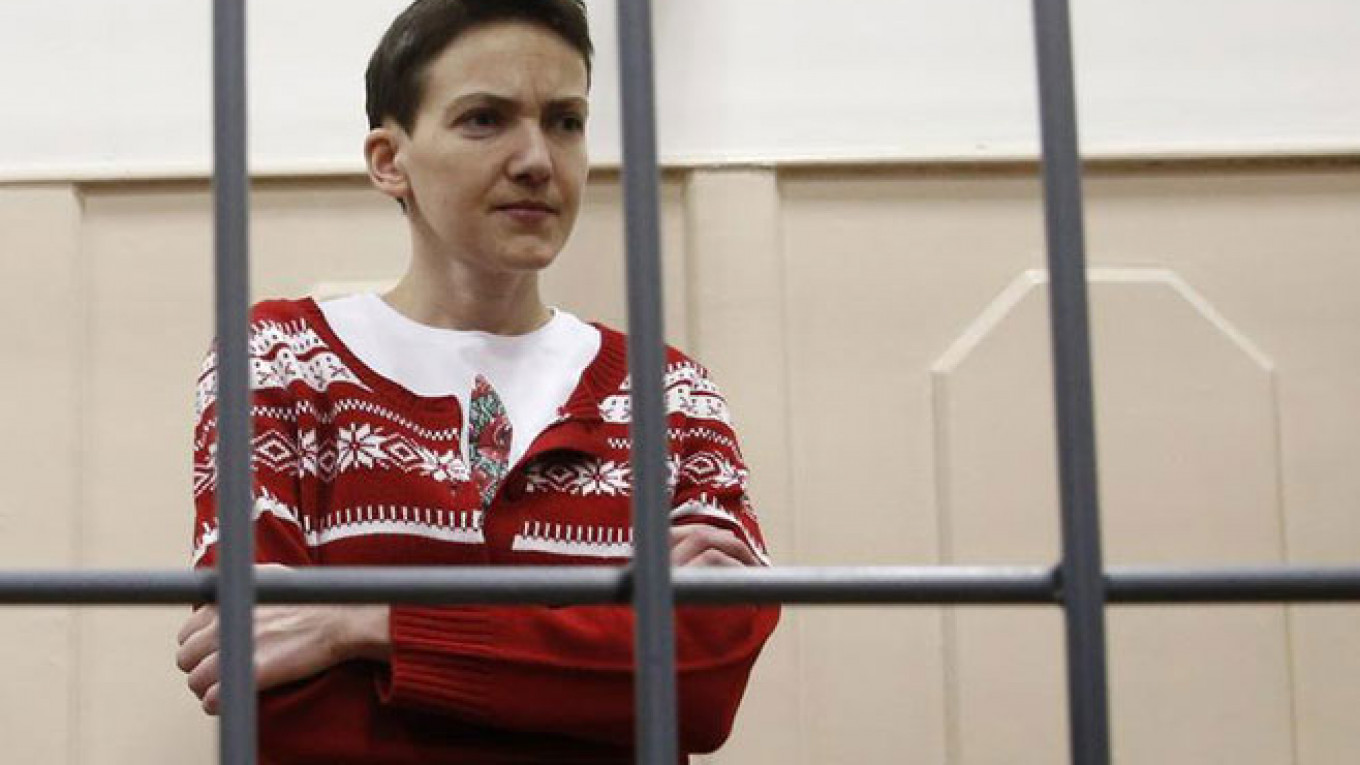Not for the first time this year, Nadiya Savchenko's health is worrying doctors, supporters and, apparently, the Russian government.
"She is thin, with black circles under her eyes," her lawyer Nikolai Polozov wrote on April 11. "Doctors say her blood has turned resinous and is very difficult for the heart to pump; there's a good chance of a blood clot and sudden death in sleep."
The day after her sentence came into force on April 5, Savchenko renewed a dry hunger strike, refusing to take any food or water until she is released. The former Ukrainian servicewoman was controversially sentenced by a Russian court to 22 years imprisonment on the charges of abetting in killing two Russian reporters in eastern Ukraine. Savchenko explicitly refused to appeal the sentence, making prisoner exchange at the highest level the only option that might lead to her walking free.
Savchenko's extreme hunger strike set a pretty tight timeframe for conducting the exchange. Even with vitamin supplements and glucose injections, it is unlikely she will last more than two weeks without food or water.
Yet so far — seven days into the strike ?€” there's little clarity about when it might happen.
Savchenko's lawyers say they are optimistic about the exchange. The mere fact that she is still being held in a pretrial detention centre ?€” not yet transferred to a prison colony ?€” is a good sign, they say. "There are details about the exchange negotiations that I can't reveal to the public, and chances are good the exchange will happen soon," Ilya Novikov, one of the lawyers, told The Moscow Times.
According to Novikov, Russian authorities are also well aware of Savchenko's worsening condition. And there are signs that it seems to worry them. Top-rank prison service officials have been assigned to monitor her, the lawyer reported.
Officially, the Kremlin has been playing it cool. Its spokesman Dmitry Peskov insists the Kremlin is not aware of Savchenko's health issues, and remains vague regarding any possible exchange.
While silent about Savchenko's fate, Russian authorities have announced that they are ready to decide the fate of four other high-profile Ukrainian convicts. On April 8, the Russian Justice Ministry asked bureaucrats to prepare paperwork for an exchange of four other Ukrainians controversially being held in custody by Russia. These include Oleg Sentsov, the prominent Crimean film director convicted to 20 years in prison in August 2015, and activist Oleksandr Kolchenko.
Just like with Savchenko, however, it is not clear when the actual exchange might happen.
According to Svetlana Sidorkina, Kolchenko's lawyer, the final decision will be made by the Supreme Court, and legal proceedings could take months. Sidorkina told The Moscow Times that, unlike Savchenko, who will most probably walk free after returning to Ukraine, Sentsov and three other convicts will continue serving their sentences there. Yet few believe Ukrainian authorities would keep Sentsov and Kolchenko, who have become national heroes in Ukraine, behind bars for long.
A major prisoner exchange would be welcomed by the West. The renewed peace accords ?€” agreed in Minsk in February 2015 by Russia, Russia's proxies, Europe and Ukraine ?€” are now a long way from reality on the ground. Any concession on Savchenko and Sentsov would offer Europe's Russian lobby much needed ammunition when the extension of sanctions comes up for discussion in July.
At the moment, however, the exchange equation is missing a crucial component: Which Russians Ukraine is willing to swap for Savchenko and Sentsov. So far, the most likely candidates are Yevgeny Yerofeyev and Alexander Alexandrov, two Russian intelligence officers caught fighting near Luhansk in eastern Ukraine ?€” Russia claims both had been discharged before traveling. Both soldiers remain on trial in Ukraine, and so far there's no end in sight.
In the meantime, Savchenko's defense is pushing for a direct answer from President Vladimir Putin, and have taken to unconventional means of getting one.
On April 14, the Russian president will field questions from members of the public in the course of an annual "Direct Line with Vladimir Putin" phone-in. This year, Savchenko's lawyer Mark Feygin has submitted a question.
It could not be simpler. "Savchenko is dying on a dry hunger strike. Are you ready to exchange her for Alexandrov and Yerofeyev?" it reads.
Contact the author at d.litvinova@imedia.ru. Follow the author on Twitter at @dashalitvinovv.


